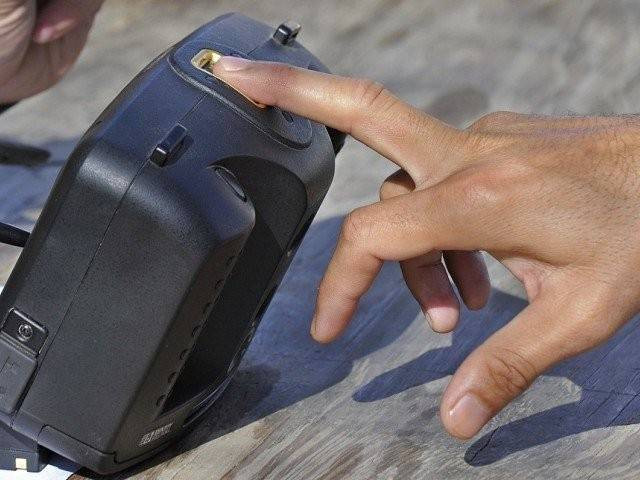2018 general elections: Poll body asks NADRA to complete fingerprint data
Biometric record of millions of voters needs to be completed

PHOTO: AFP
Through a letter, the ECP sought from NADRA the countrywide details of all voters whose fingerprints were not available and asked it to make arrangements to record all of them before the elections.
It is estimated that NADRA does not have the fingerprint record of 10% to 12% CNICs, or millions of voters. This is one of the main hurdles for the ECP if it would want to move from manual to electronic voting.
Performance of biometric machines poor: ECP
The issue came into the limelight during this month’s by-election in the National Assembly constituency NA-120, Lahore, where the ECP installed 100 biometric voting machines (BVMs) for a test run alongside the normal process.
Before the September 17 polling, the ECP asked NADRA to provide the biometric fingerprints of all registered voters of NA-120.
Out of the total 321,786 voters in the constituency, NADRA could not provide the data of 29, 607.
It claimed that most of these people had received Computerised National Identity Cards before NADRA introduced biometric fingerprint machines in 2005-06. During that period, fingerprints were taken and stored on paper.
NADRA claimed that of the 29, 607 people, 26, 349 had acquired CNICs before 2005-06 and the CNICs of 24, 099 had expired and not been renewed because of death, migration or other reasons. Another 2, 271 possessed the National Identity Card for Overseas Pakistanis (Nicop) after submitting their fingerprints on paper.
The remaining 772 people were not able to register their fingerprints because of skin issues, amputated or bandaged fingers or being elderly.
The test run of the BVMs did not yield a promising result as they failed to read the fingerprints of 12% voters whose data had been provided by NADRA to the ECP.
NADRA ‘unhelpful’: Biometric machines may end up gathering rust
The ECP used 100 BVMs in 39 polling stations of the constituency, having 57,265 registered voters.
Amid a low turnout, a total of 22,181 voters used the BVMs. The machines verified 19,520 of them through the fingerprints and other data. They could not read the fingerprints of 2,646 voters – 12% of those who tried the technology.
ECP sources said the commission had also carried out a low-key test of BVMs in a constituency in Khyber-Pakhtunkhwa a few months back. The results were even more abysmal as the machines failed to read about 40% fingerprints.
In July, the polls supervisory body had to abandon a plan to test biometric thumbprint verification machines in the Sindh Assembly’s PS-114 constituency since NADRA did not share the required data.
The ECP wants to test the biometric verification and electronic voting machines in more constituencies to check their applicability before taking a final decision about using them.


















COMMENTS
Comments are moderated and generally will be posted if they are on-topic and not abusive.
For more information, please see our Comments FAQ